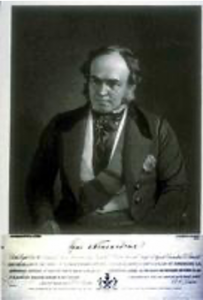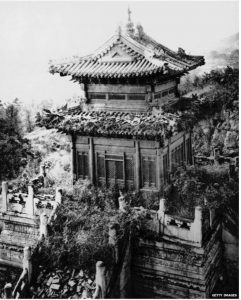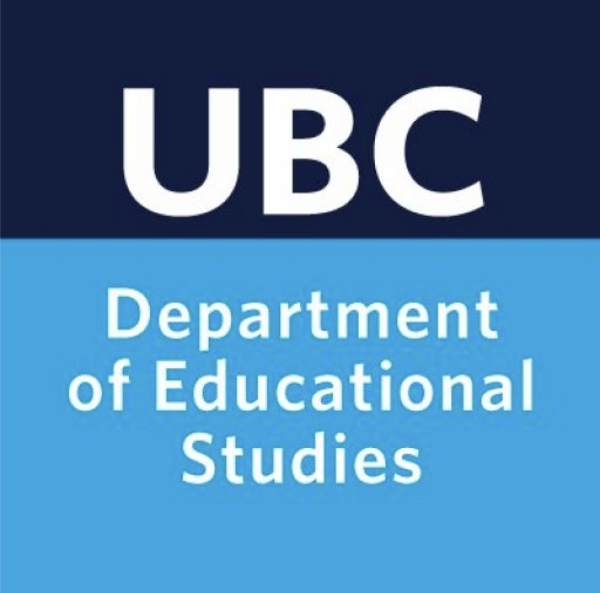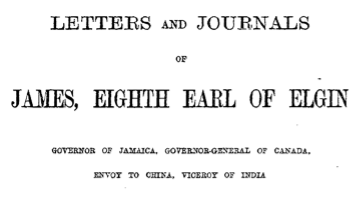This is the third and final post in the series from the course “Topics in the History of Education: Histories Confronting White Supremacy,” led by Professor Mona Gleason.
This course delves into colonialization, racism, and systemic oppression, exploring how historical understanding shapes our world today. In this series, students collaborated to craft blog posts where they explore themes related to course topics and share their insights with the larger EDST audience.

Co-authored by Ruchika Bathla, Marc-André Fortin, and Phoebe Lee, this blog post looks at James Bruce, 8th Earl of Elgin’s impact on political institutions in Canada, China, and India. The authors analyze Elgin’s writings, revealing British colonialist and supremacist views and examine his role in shaping Canadian, Chinese, and Indian histories.

Preamble: We form a triad of students whose origins are respectively from Québec, Hong Kong, and India. We read the “Letters and Journals of James Bruce, 8th Earl of Elgin” with an interest in studying how this man influenced the forming of political institutions in our respective countries. We also reviewed remarks and opinions left in his letters and journals, exposing British colonialist and supremacists’ views during this imperialist period of the United Kingdom.

Introduction: James Bruce, 8th Earl of Elgin (1811-1863) was appointed Governor General of Canada from 1847 to 1854. He was educated in Eton and Oxford, among a ruling elite of noblemen and future politicians who would play decisive roles and truly shape the British empire.
The selection of British administrators and diplomats from among the aristocratic elite was made deliberately to ensure that the expansion of the empire remained under the leadership and governance of individuals who shared a common vision of colonialism, British maritime supremacy, and military administration.
Lord Elgin’s first appointment overseas was as Governor General of Jamaica (1841-1846), followed by Governor General of Canada (1847-1856), then High Commissioner and Plenipotentiary in China and the Far East to assist in the process of opening China and Japan to Western trade (1857-1859). Finally, he was Viceroy of India (1862-1863).
This diversity of geographical locations, national contexts, missions, actions, and functions, at a key moment in the expansion and consolidation of the British empire and in a century of European colonial hegemony, makes the study of Lord Elgin’s letters and journals of high relevance to historians interested in analysing the ontologies and epistemologies of colonial white supremacy.
Elgin left an impressive number of letters and journals of his successive appointments. Many of these documents were published 9 years after his death in 1872 and still represent one of the most important accounts of British government administration in the colonies during the early Victorian period (1840-1860), making them pivotal not only in the history of Canada, but also of China, and India.
In his first appointment to Jamaica (1841-1846), a colony struggling to contend with the end of slavery, Elgin contemplated the possibility to develop a schooling system for Black Jamaicans. Through his own education, he carried incommensurable faith in the capacity of British institutions to adapt in various and heterogeneous conditions. At that period, a population of white landowners were ignored by their former slaves, and the sugar industry was hopelessly in search to hire workers. The exports of the island had dwindled to one-third of their former amount.
To restore the economic prosperity of the island, Lord Elgin proposed a re-education project, with a very specific conception of education in mind. He proposed increasing agricultural production on the island through the development of a vocational educational program for mechanical technologies, to be deployed by the planter’s oligarchy. Elgin tried to convince the planters that education for Black Jamaicans, and in particular for this specific objective, was necessary:
“he (Elgin) lost no opportunity of impressing on the landowning class that, if they wished to secure a constant supply of labour, they could not do so better than by creating in the labouring class the wants which belong to educated beings” (Elgin, 1872, p. 17).
Of course, in this post-slavery situation, Black people neither trusted the British rulers nor the planter’s oligarchy. Convincing and motivating former slaves to come back as workers for the class who formerly owned them as slaves proved challenging, if not impossible.
Interestingly, Lord Elgin’s writings reflect a difficulty to conceptualize and accept this absence of trust for institutions. This apparent lack of “obedience” was perceived as a threat to further economic development of the colony. Black individuals were considered bodies that need to be put back—with low wages—to their former sugar cane fields.

In his reflections Elgin never considers self-governance, sovereignty, or independence for the people of Jamaica. Haiti, the first Black republic to declare independence through a revolution, was declared a pariah among the leading European countries. To access international recognition, in 1825 the country was forced to pay France the equivalent of 560 million dollars in today’s value, thus creating the first case of neocolonization through indebtment (Porter et al., 2022).
Governor General of British North America (Canada: 1847-1856)
Immediately after his return from Jamaica, Lord Elgin was appointed to Canada. His impact and legacy on Canadian affairs included the development of responsible government that included French Canadians while excluding Indigenous peoples.
Lord Elgin’s Legacy on British-Chinese Diplomatic Relations
At least 120 pages of Elgin’s Letters and Journals describe the events which led to the Second Opium War (SOW). The First Opium War (1839-1842) ensued as China enforced a ban on opium trade, triggering conflict with Britain, whose government supported merchants’ demands for compensation and equal trade rights. Britain’s superior military technology led to victory in August 1842, resulting in the Treaty of Nanjing, which forced China to expand foreign trade, offer compensation, and cede Hong Kong to Britain. Subsequently, in October 1856, Governor Ye Mingchen’s seizure of a Hong Kong-registered ship escalated into a diplomatic crisis, prompting Elgin’s appointment as High Commissioner to negotiate a free trade agreement with China.
In his writing Lord Elgin reveals a tormented soul; he is torn between his duties as an official representative to the Queen, and his moral opinions about the goals and nature of his intervention in the East. His evident aversion of the opium trade is counterbalanced by his prejudice about what he perceives as a lack of moral courage by the Chinese elites to fight against this scourge so strongly developed and maintained by the European traders.
Elgin’s presence in China was to negotiate the best trade deal for Britain, which meant the best way for Britain to continue to exert its foreign power, to sell more opium, and to plunder Chinese resources. After a few weeks in Hong Kong preparing for the Canton siege, Elgin expresses these thoughts:
“It is clear that there will be no peace till the two parties fight it out. The Chinese do not want to fight, but they will not accept the position relatively to the strangers under which alone strangers will consent to live with them, till the strength of the two parties has been tested by fighting. The English do want to fight.”
Elgin, adhering to Victorian liberalism, advocated for free trade to maintain international peace, although this conflicted with his actions as a colonial administrator. Advancing on Canton on a warship, Lord Elgin expressed his sadness to Commodore Elliot: “I never felt so ashamed of myself in my life (…) The people seemed very poor and miserable, suffering, I fear, from this horrid war” (Elgin, 1872, p. 212-213).
Despite his reluctance, he accepted the necessity of the Second Opium War to protect British interests in free trade, revealing the disparity between his well-meaning policies in Canada and his approach to Chinese affairs. Elgin believed that free trade and Victorian liberalism would promote peace, yet this peace would always disregard the inherent power imbalance between Britain and China. The challenge of communication between the English and Chinese highlighted the complexities of imperial governance, reflecting white supremacy justified under the guise of public good through Victorian liberalism.
Hence Lord Elgin went to war to protect British interests, including Hong Kong, but interests that deliberately excluded mainland China and the Chinese public:
“to England the war is throughout an industry, a way to wealth, the most thriving business, the most profitable investment of the time. By conquest she made for herself an Empire and the Empire made her rich” (Tong, 2007, p.47).
As a colonial administrator, Elgin’s role was to “break down the barriers behind which these ancient nations sought to conceal from the world without their mysteries” (Tong, 2007, p. 45). War, for Elgin, was meant to secure trade for a white power, and to extract the mysterious Chinese knowledge for the British public to enjoy.

Elgin’s interventions in China were meant to exclude the Chinese public, to the benefit of a British public situated continents away geographically, a vision operationalised by the colonial instrument that was Hong Kong. One can argue that this narrow view of public good had an important influence in the British administration of Hong Kong affairs until 1997.
The SOW culminated by the looting and destruction of the Summer Palace, conducted through a French-British coalition led by Lord Elgin. To this day, this destruction of the most beautiful of the Chinese palaces, remains a fundamental trauma in the Chinese psyche and a topic of tense discussions between Britain and China for the repatriation of several precious artifacts (Bowlby, 2017; Jin, 2020).
Lord Elgin’s Legacy on Consolidating the British Raj in India.
Lord Elgin played a significant role in the consolidation of British rule in India during the transition from the British East India Company to direct imperial control by the Crown. He was appointed as second Viceroy of India in 1862. Elgin’s tenure of twenty months as Viceroy of India exemplifies the complex interaction between colonial governance and racial dynamics. In private correspondence, Elgin expressed disdain and contempt toward Indian and Chinese populations, illustrating a paternalistic view of the colonial administration’s role in uplifting “inferior races” to Western standards (Elgin, 1872, p.199).
Unlike in Canada, where he exercised significant power, in India Elgin advocated for a local government and inclusion of native Indian rulers in legislative councils to prevent rebellion, while employing a strategy of “riding them with a loose rein” to maintain control (Elgin, 1872, p. 422). Elgin attempted to bolster British prestige through grand ceremonial diplomacy like through grand durbars, large public ceremonies dating back to Mughal traditions. During these ceremonies, the supreme ruler (the King or Queen of England, Emperor or Empress of India), symbolically “absorbed” the power of other chiefs by granting them honours and presents.
Demonstrating a pragmatic and calculated approach to colonial rule, Lord Elgin blended strategic diplomacy and exploitative practices. However, his career in India was abruptly cut short when he unexpectedly passed away after only twenty months in office. Spending the summer of 1863 in Shimla, he succumbed to heart disease while on tour in upper India at Dharamshala. His body was buried in an Anglican graveyard of this hill town, adjacent to a neogothic church and surrounded by evergreens, an environment strangely reminiscent of Canada.

References:
- Bowlby, C. (2017). The palace of shame that makes China angry. https://www.bbc.com/news/magazine-30810596
- Cazzola, M. (2021). British Imperial Administration and the “Thin Crust of Order”: Society, Constitution, and Diplomacy in the Political Thought of Lord Elgin. Annals of the Fondazione Luigi Einaudi. An Interdisciplinary Journal of Economics, History and Political Science, LV(1), 281-302.
- Elgin, J. B. (1872). Letters and Journals of James, Eighth Earl of Elgin: Governor of Jamaica, Governor-General of Canada, Envoy to China, Viceroy of India. John Murray.
- Foucault, M., Senellart, M., & Collège de France. (2008). The birth of biopolitics : lectures at the Collège de France, 1978-79. Palgrave Macmillan. Table of contents only http://www.loc.gov/catdir/toc/ecip0814/2008011805.html
- Friedman, M. (1955). The Role of Government in Education,. In R. A. Solo (Ed.), From Economics and the Public Interest. Rutgers University Press.
- Jin, V. (2020). A tale of two Elgins. Classical Inquiries Dialogues. https://classical-inquiries.chs.harvard.edu/a-tale-of-two-elgins/
- Justice, B. (2023). Schooling as a White Good. History of Education Quarterly, 63(2), 154-178. https://doi:10.1017/heq.2023.7
- Larner, W. (2000). Neo-liberalism: Policy, Ideology, Governmentality. Studies in Political Economy, 63(1), 5-25. https://doi.org/10.1080/19187033.2000.11675231
- Lowe, L. (2015). The intimacies of four continents. Duke University Press.
- Morison, J. L. (1924). Lord Elgin in India, 1862-63. The Cambridge Historical Journal, 1(2), 178-196.
- Porter, C., Méheut, C., Apuzzo, M., & Gebrekidan, S. (2022). THE RANSOM: The Root of Haiti’s Misery: Reparations to Enslavers. The New York Times. https://www.nytimes.com/2022/05/20/world/americas/haiti-history-colonized-france.html
- Tong, Q. S. (2007). Traveling Imperialism: Lord Elgin’s Missions to China and the Limits of Victorian Liberalism. In D. Kerr & J. Keuhn (Eds.), A Century of Travels in China: Critical Essays on Travel Writing from the 1840s to the 1940s. (pp. 39-51). Hong Kong University Press.



Leave a Reply